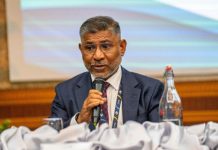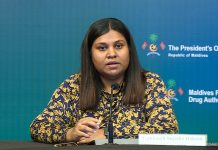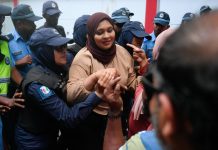The Anti-Corruption Commission (ACC) has declared that no investigations are underway regarding a monthly cash handout by President Muizzu to MPs of the People’s National Congress (PNC). This handout, purportedly distributed directly from the President, has sparked controversy and allegations of corruption.
President Muizzu’s decision to provide money to PNC MPs has been confirmed by several members of the party. Most MPs received MVR 50,000 monthly, although discrepancies exist with higher sums allocated to MPs from certain constituencies. With 75 PNC MPs in the People’s Majlis, the total monthly outlay for these payments amounts to MVR 3.75 million, a substantial sum whose origins remain obscure, even to the beneficiaries themselves.
When questioned about the possibility of an ACC investigation, a spokesperson for the commission cited the absence of any formal complaints as a barrier to launching a probe. This stance raises eyebrows, especially in light of the legal and ethical implications surrounding such financial transactions within the political landscape of the Maldives.
Maldivian Democratic Party (MDP) Chairperson Fayyaz Ismail and former President Abdulla Yameen, have condemned the cash handouts as blatant acts of corruption. They argue that the payments to MPs potentially violate anti-corruption laws that prohibit bribery, carrying severe penalties including lengthy prison terms.
President Muizzu defended his decision during a meeting at Muleeage, where he announced the monthly disbursements. Despite internal dissent from some PNC MPs who urged reconsideration, the President remained steadfast, insisting that the initiative was legitimate and necessary.
The controversy deepens as the government continues to dismiss allegations of impropriety as politically motivated attacks from the opposition. Calls for independent scrutiny and accountability are growing louder, underscoring the need for impartial agencies to intervene and investigate these allegations thoroughly.
The law on prevention and prohibition of corruption in the Maldives explicitly forbids bribery of elected officials. Such provisions are crucial to maintaining the integrity of democratic processes and ensuring that public office holders remain accountable to the citizens they represent.
While President Muizzu’s cash handouts to PNC MPs may have been intended as a gesture of support, their execution raises significant concerns regarding transparency, accountability, and adherence to legal standards. The ACC’s reluctance to initiate an investigation in the absence of complaints underscores the challenges facing anti-corruption efforts in the Maldives. As the debate intensifies, the spotlight remains firmly on whether justice and integrity will prevail in the realm of Maldivian politics.


















